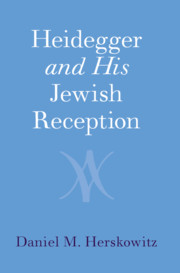Book contents
- Heidegger and His Jewish Reception
- Heidegger and His Jewish Reception
- Copyright page
- Dedication
- Contents
- Preface
- Acknowledgments
- 1 Herkunft and Zukunft: Heidegger, Christianity, and Secularization
- 2 Kant’s Legacy and New Thinking: Heidegger, Cassirer, and Rosenzweig
- 3 A Christian Anthropology? Early Jewish Readings of Sein und Zeit
- 4 Dwelling Prophetically: Martin Buber’s Response to Heidegger
- 5 The Destruktion of Jerusalem: Leo Strauss on Heidegger
- 6 God, Being, Pathos: Abraham Joshua Heschel’s Theological Rejoinder to Heidegger
- 7 Uprooting Paganism: Emmanuel Levinas Faces Heidegger
- Conclusion Which God Will Save Us? Heidegger and Judaism
- Bibliography
- Index
5 - The Destruktion of Jerusalem: Leo Strauss on Heidegger
Published online by Cambridge University Press: 24 September 2020
- Heidegger and His Jewish Reception
- Heidegger and His Jewish Reception
- Copyright page
- Dedication
- Contents
- Preface
- Acknowledgments
- 1 Herkunft and Zukunft: Heidegger, Christianity, and Secularization
- 2 Kant’s Legacy and New Thinking: Heidegger, Cassirer, and Rosenzweig
- 3 A Christian Anthropology? Early Jewish Readings of Sein und Zeit
- 4 Dwelling Prophetically: Martin Buber’s Response to Heidegger
- 5 The Destruktion of Jerusalem: Leo Strauss on Heidegger
- 6 God, Being, Pathos: Abraham Joshua Heschel’s Theological Rejoinder to Heidegger
- 7 Uprooting Paganism: Emmanuel Levinas Faces Heidegger
- Conclusion Which God Will Save Us? Heidegger and Judaism
- Bibliography
- Index
Summary
Heidegger’s pivotal impact on Leo Strauss’s thought is widely acknowledged. As one commentator notes: “One could almost say that Heidegger is the unnamed presence to whom or against whom all of Strauss’s writings are in large part directed.” This view is confirmed by Strauss himself, who proclaimed that “the only question of importance … is the question whether Heidegger’s teaching is true or not.” While much has been written on Strauss and Heidegger, here I wish to focus on the intersections of Strauss’s understanding of Heidegger and Judaism. The chapter’s argument is threefold: first, that Strauss’s lifelong grappling with matters Jewish are importantly marked by the philosophical, theological, and political challenges reflected in Heidegger; second, that his engagement with Heidegger unfolds within the context of his reflections on the Jewish engagement with modernity, understood as a project indebted to the Christian horizon; and third, that while he sees Heidegger as representing the “danger” and high point of the modern crisis in both philosophy and religion, it is, paradoxically, Heidegger who offers the theoretical breakthrough that directs out of the crisis.
- Type
- Chapter
- Information
- Heidegger and His Jewish Reception , pp. 175 - 219Publisher: Cambridge University PressPrint publication year: 2020

